How To Tell If a Roofer Is Lying? 10 Red Flags To Avoid Roofing Scams
Finding a roofing contractor to replace your old roof can be stressful, so how do you know if a roofer is lying or legitimate?
To tell if a roofer is lying, first avoid roofing scams involving door-to-door storm chasers, high-pressure salespeople, or contractors asking for large upfront payments.
Whether you live in a major city or smaller suburbs, such as Downers Grove, Hinsdale, or Naperville, IL, we uncover exactly how to spot a dishonest roofer.
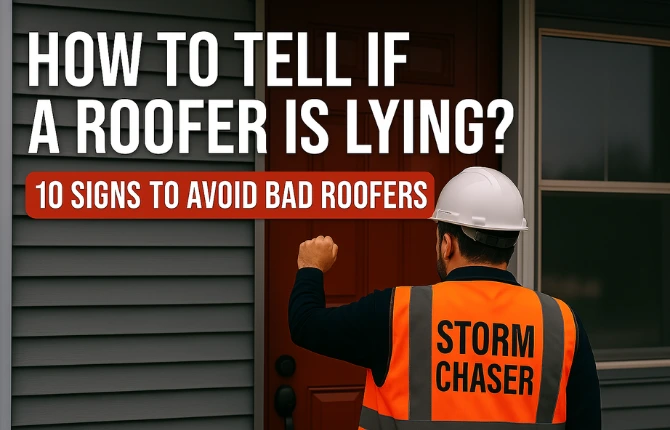
With over 21 years of roofing experience, we’ve seen every type of roofing company red flag and homeowner roofing contractor nightmare.
From roofers scamming insurance companies to unlicensed contractors stealing deposits, there’s no lack of horror stories in roofing. That all ends today.
Our expert roofing team shares the top ten red flags to avoid a nightmare roof replacement or roof repair project by a scammer or a bad roofer.
We’ll cover each of these below but, as an easy reference, here is our list of the top ten signs to watch out for:
- Storm Chasers & Door-Knocker Roofers
- Lack of Great Reviews or Real References
- Not Licensed, Bonded, or Insured
- Is the Roofing Company Actually Local?
- Unrealistic Warranties and Too-Good-To-Be-True Prices
- Large Upfront Payments or Cash-Only Requests
- No Written Quote or Missing Project Details
- Unprofessionalism and Poor Communication
- Lead Resellers, Fake Companies, and Shady Business Practices
- No Photos, References, or Project Examples
- 2025 Update: Insurance Companies Are Cracking Down on Storm Chasers
Because no homeowner deserves to risk tens of thousands of dollars by hiring a roofing contractor scam artist or roofer who installs a low-quality or faulty roof.
1. Storm Chasers & Door-Knocker Roofers
When a big hailstorm hits Downers Grove, Naperville, Darien, or any suburb nearby, you can count on one thing: door-to-door roofers showing up out of nowhere.
These guys might introduce themselves as insurance specialists or roofing reps “working on your neighbor’s house.”
However, don’t be fooled—they’re likely storm chasers looking to cash in quick. In order to tell if a roofer is lying, avoid working with these types of roofing companies.
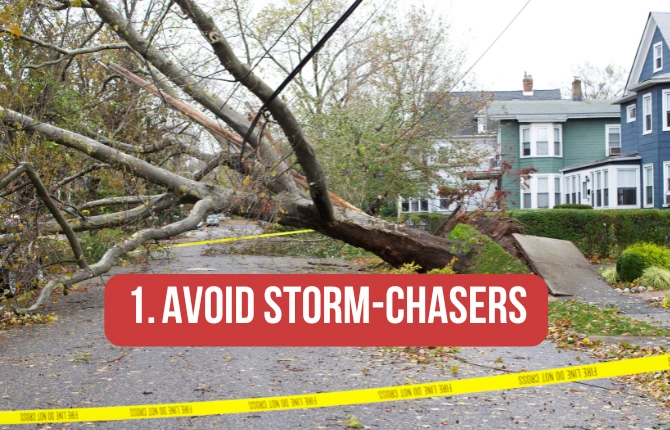
Some even pose as village inspectors, as happened in Western Springs in 2019. It’s not just shady—it’s dangerous.
We’ve heard it all over the years. A homeowner in Woodridge recently told us a salesperson knocked on her door offering a “free inspection.” Twenty minutes later, they claimed there was major hail damage—only to push her into signing paperwork on the spot before ever showing her a photo of the issue.
Oftentimes, these roofing scams spike after major storms. According to the Better Business Bureau of Chicago, storm chasers often pose as local contractors and disappear after collecting an insurance payout or deposit.
Why Do Roofing Insurance Fraudsters Lie?
Some roofers specialize in lying to insurance companies, which equates to insurance fraud, with homeowners paying the true price.
They’ll knock on your door, claim your roof is badly damaged, and pressure you to file an insurance claim on the spot—sometimes offering to “cover your deductible.”
It sounds helpful, but it’s usually a play to bill your insurance company for work you might not need. In some cases, your premiums will spike, or worse, your policy could be canceled altogether.
Lying Roofer Red Flags
- They knock on your door after a storm or cold call you out of nowhere
- Use scare tactics like “your roof could collapse” or “everyone in the neighborhood is filing claims”
- Claim you’re getting a “free roof” through insurance
- Ask for a large deposit before doing anything
- Refuse to provide a local business license, insurance proof, or ID
Green Flags
- The roofer is based locally and has served your neighborhood for years
- You found them through a personal referral or online, not a cold call
- They inspect the roof system thoroughly and show you photos of any damage
- They walk you through the insurance process, not pressure you into it
- They never ask for full payment upfront
Pro Tip from Andre:
“If you didn’t call them, don’t hire them. A trustworthy roofer will never pressure you at the doorstep—especially after a storm. Instead, look for a locally owned company with real reviews and references in your area.”
Want to avoid the headache? At HomeHero Roofing, we’ve helped dozens of homeowners in Darien, Willowbrook, and Hinsdale double-check questionable roofing claims. When in doubt, get a second opinion from a trusted local roofer before signing anything.
With rising material prices due to tariffs, are you wondering how much residential roofing costs this year? Find out in our new roofing service price guide for 2025.
2. Lack of Great Reviews or Real References
In 2025, it’s not enough to have a website or a truck with magnets. If a roofer doesn’t have real, verifiable reviews online, it’s a red flag. I would think twice about trusting roofers with little or no reviews online in 2025.
When you’re spending $10,000+ on a roof, you want proof, not promises. That starts with a healthy track record of local homeowners saying, “These guys showed up, did great work, and followed through.”
In DuPage County, a legitimate roofing company should have at least 40 verified reviews on Google, Yelp, Nextdoor, or the BBB. In addition, look for photos of roofing projects, project details, and patterns of consistent 5-star feedback across multiple platforms.
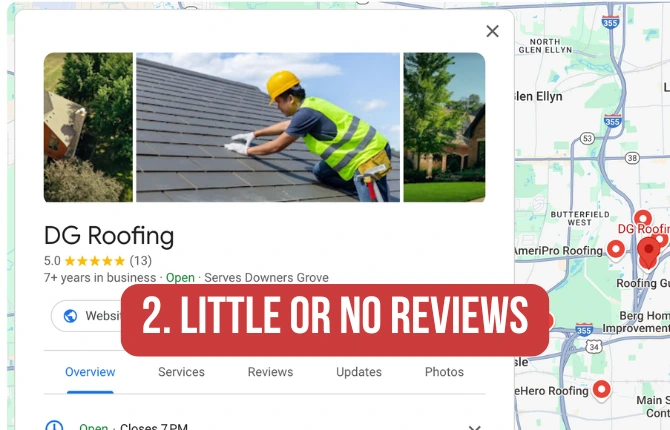
If you can’t find more than a handful of reviews—or worse, if their “5-star” ratings are generic with no photos or context—tread carefully. A common scam tactic is buying fake reviews or creating a new business name to bury bad past jobs.
Need a real-life example? Just look at AmeriPro Roofing in Downers Grove, where customers have reported being ghosted after insurance checks cleared.
Also, check reviews for patterns. Do the reviews mention delays, poor cleanup, or warranty issues? That’s often where the truth lives.
Unfortunately, AmeriPro’s BBB complaints page shows a troubling trend—missed appointments, poor communication, and lack of follow-through.
Bad Roofer Red Flags
- Less than 40 reviews or none on major platforms like Google, Yelp, or BBB
- All 5-star reviews with vague or copy-paste phrasing
- No customer-uploaded project photos or names mentioned
- No local references or recent jobs in your area
- They get defensive when you ask for past client info
Green Flags
- 40+ real reviews with photos, local project names, and details
- Recent feedback on Google or Nextdoor from homeowners near you
- They gladly share names and phone numbers of past customers (with permission)
- You see consistent praise for communication, cleanup, and timeliness
- They have video testimonials or job walk-throughs on their website or social media
Pro Tip from Andre:
“Don’t just count stars—read the most recent reviews. Look for local towns mentioned like La Grange, Westmont, or Oak Brook. If every review sounds like it was written by ChatGPT, it probably was.”
At HomeHero Roofing, we’ve earned tons of 5-star reviews across the western suburbs because we do what we say. If you want to speak to a recent customer before hiring us, just ask—we’re proud of every roof we’ve installed.
3. Not Licensed, Bonded, or Insured
One of the fastest ways to spot a sketchy roofer? Ask for their roofing license number. If they hesitate, change the subject, or say “you don’t need to worry about that”—walk away.
For example, in Illinois, all roofing contractors must be licensed by the state through the Illinois Department of Financial and Professional Regulation (IDFPR). The license should start with 104 (for residential roofing) or 105 (for commercial work).
Indeed, different states have different roofing license requirements. In many cases, you can check if a roofer near you is licensed on your state’s or county’s website.
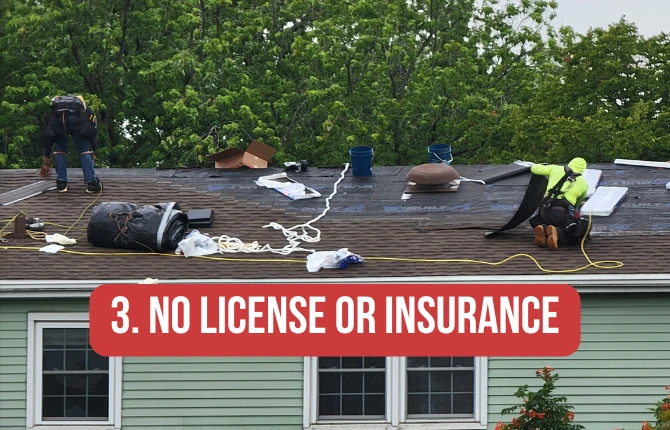
Moreover, a legit roofer will also carry liability insurance, workers comp, and be bonded in the state of Illinois. Why does that matter? If something goes wrong—like property damage or an injured worker—you could be on the hook if your roofer isn’t properly insured.
Even worse, some scammers have no license or insurance and use fake business names, mailbox addresses, or virtual offices to appear local.
Take this investigation in Illinois where a roofer was caught operating without a license, leaving a trail of angry customers and unfinished jobs.
Red Flags
- No state roofing license number or gives a “general contractor” license instead
- Can’t provide proof of liability insurance or workers comp
- Uses a P.O. Box or virtual office address (e.g., Regus office listings)
- Avoids putting license or insurance info in writing
- Not listed on the IDFPR contractor lookup tool
Green Flags
- Has an Illinois roofing license that starts with 104 (residential) or 105 (commercial)
- Will send over or show you a certificate of insurance on request
- Lists full business name, license #, and contact info clearly on quotes and contracts
- Is bonded and registered with the state (extra layer of protection for you)
- Encourages you to verify their credentials independently
Pro Tip from Andre:
“If a roofer is legit, they’ll be proud to show you their credentials. At HomeHero Roofing, our Illinois license, insurance coverage, and bond status are included on every estimate—no surprises, no games.”
Want to double-check a roofer’s license in Illinois? Head to the IDFPR license lookup tool and search for their name or business. If they’re not there, don’t hire them.
4. Is the Roofing Company Actually Local?
These days, plenty of roofing companies look local. However, digging deeper, you’ll find a virtual office, a vague “About Us” page, and no trace of who’s doing the work.
Moreover, some don’t even operate in Illinois or your state at all.
No question, being a locally-owned roofing company matters in Chicagoland suburbs like Downers Grove, Lisle, and Oak Brook, IL.
Why? Local roofers know the village permit requirements, building codes, and how to install a roof that holds up through brutal Midwest winters.
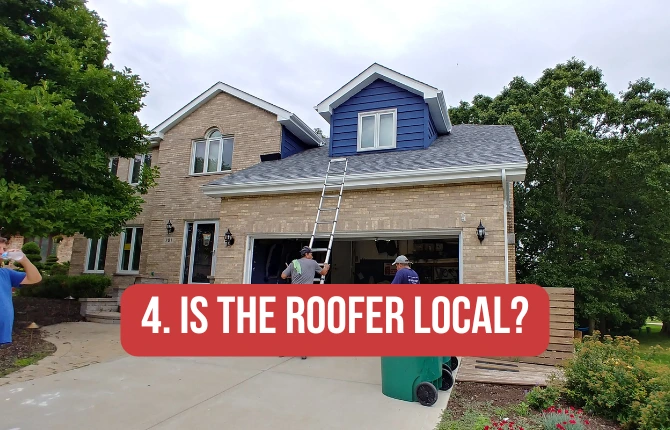
Out-of-town con artists will claim to be a reputable roofing contractor or, worse, fraudsters posing as local adjusters to inspect or determine roof replacement costs.
For example, in 2019, a scammer posed as a Western Springs village inspector and tricked homeowners into letting him “inspect” their roofs. Certainly, that kind of stuff doesn’t happen when you work with a company rooted in your community.
Roofing Company Red Flags
- Generic business name with no listed owner or staff info
- P.O. box, mailbox service, or Regus/virtual office address
- No photos of recent jobs, trucks, or team members
- “Serves all 50 states” or multiple states with no local license
- Won’t mention which towns they’ve actually worked in
Green Flags
- Company lists a real business address and phone number in your area
- Has reviews or testimonials from homeowners in your neighborhood
- Posts photos or videos of real crews and real jobs on social media
- Owners or team members live nearby and are part of the community
- Member of local chambers or involved in area events, charities, or causes
Pro Tip from Andre:
“We’ve seen ‘roofing companies’ try to pass off rented mailboxes in Westmont as their office. A real local roofer knows your street, not just your ZIP code.”
No question, the HomeHero team lives here in the neighborhood we work in. As a result, we’ve helped hundreds of homeowners in Downers Grove, La Grange, Willowbrook, and nearby suburbs.
Accordingly, a trusted local roofing contractor isn’t just installing residential roofs; they’re building a reputation in our own backyard.
Find out how long roofs last on average in Illinois in one of our latest homeowner help guides.
5. Unrealistic Warranties and Low Ball Prices
If a roofer’s price seems too good to be true, it probably is. And if they say your roof will “last a lifetime” without showing what that actually means?
Here’s the truth: in Chicagoland, no asphalt shingle roof lasts forever—not in our freeze-thaw cycles, hailstorms, and humid summers. Realistically, the only thing that’ll extends a roof’s lifespan is quality work done by experienced professionals using quality roofing materials.
Even top-of-the-line shingles last around 25–30 years if installed perfectly. So when a contractor promises you a “lifetime roof,” ask what that means in plain English.
Better yet, get it in writing.
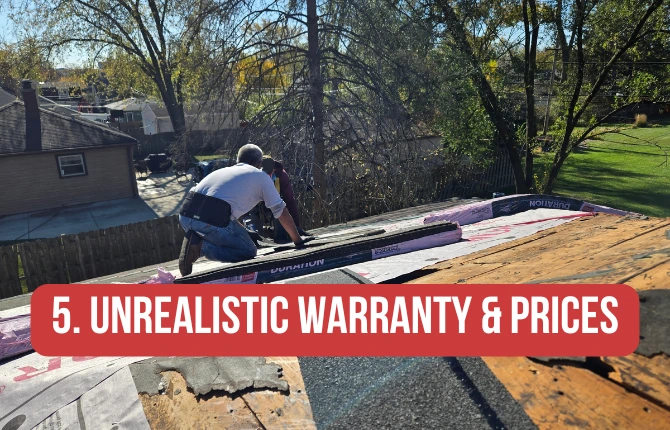
Some scammers quote extremely low prices to win your business, then hit you with surprise change orders, upcharges, or cheap, off-brand materials. Others exaggerate damage to pad the bill, especially on insurance jobs.
There was even a case in Palos where a roof repair subcontractor was caught scamming a homeowner by inflating the cost and demanding extra payment mid-job. These types of guys will ghost you after cashing your check.
And those “lifetime warranties”? They usually vanish when the LLC closes, which happens a lot with these pop-up roofing companies.
Low Priced Roofing Contractor Red Flags
- Quotes that are significantly lower than other contractors
- Vague or “lifetime” warranties with no written terms
- Salespeople pressuring you to sign same-day to get a “special deal”
- No itemized estimate or breakdown of materials and labor
- Promises like “we can start tomorrow” with no crew or schedule plan
Green Flags
- Estimates in line with other professional roofers (not suspiciously low)
- Clear, written warranties (typically 5–10 years for workmanship)
- Transparent pricing with a full breakdown of what you’re paying for
- Willing to answer questions and explain any differences in price
- Offers multiple shingle options with real product brochures
Pro Tip from Andre:
“We’ve been called in to fix too many botched jobs where the homeowner thought they were saving $3K, but ended up paying double to repair the mess. A cheap roof is the most expensive kind in the long run.”
Our roofing company believes in honest pricing, no hidden fees, and real warranties, which you can read in your quote. Good, honest roofers will walk you through your quote line-by-line and give you options that fit your budget without cutting corners.
Learn about the best paint colors that coordinate with brown roof shingles in our latest expert roofing post!
6. Large Upfront Payments or Cash-Only Requests
If a roofer asks for a massive deposit or wants you to pay in full before starting roofing work, that’s a gigantic red flag. In particular, legitimate roofing companies don’t need to strong-arm you for money before doing any work.
In Illinois, it’s recommended that contractors collect no more than 10–20% upfront. That’s just enough to reserve your spot and order materials. Anything higher, especially 50% or more, is risky, especially when they ask for cash, Zelle, or QuickPay.
Proper flashing is one of the keys to a roof that lasts for decades. Get the lowdown on all things drip edge flashing in our new article!
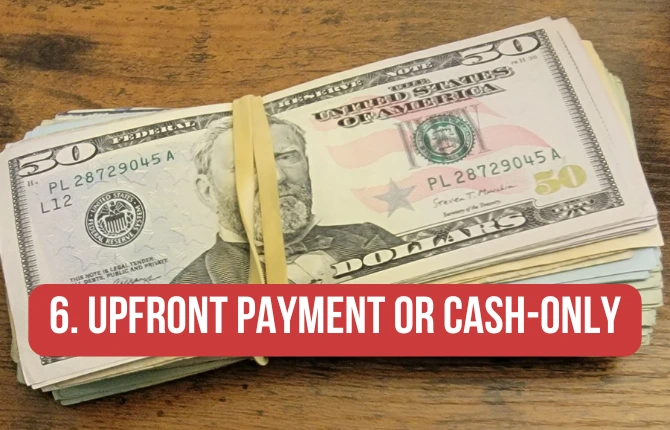
We’ve seen horror stories where homeowners paid thousands upfront, only for the roofer to disappear or delay the job indefinitely. In one recent case reported by CBS Chicago, a homeowner paid $25,725 and never saw the crew again.
Also, watch out for roofers who try to charge you directly for permits or ask you to front money for materials. By all means, purchasing materials or equipment is their responsibility.
All in all, they probably shouldn’t be in business if they don’t have the capital to cover materials or get a permit.
Cash-Only Roofers Red Flags
- Demands for 50% or more of the job cost before starting
- Asks for cash, Venmo, Zelle, or QuickPay as the only payment method
- Refuses to provide a payment schedule in writing
- Tries to make you pay for permits or materials separately
- No receipts or written confirmation of deposit
Green Flags
- Requests a reasonable deposit (10–20%) to secure scheduling and materials
- Accepts credit cards, checks, or financing with clear documentation
- Provides a detailed payment schedule tied to milestones (e.g., materials delivery, job completion)
- Issues receipts and documents all payments made
- Pulls and pays for the permit themselves and includes that in the estimate
Pro Tip from Andre:
“No honest roofer should ever ask for 50% down. If they do, they’re either desperate or planning to vanish. At HomeHero, you’ll never pay more than necessary upfront—and everything is documented, in writing, before we start.”
Indeed, we use professional estimating tools, transparent contracts, and flexible payment options to make things easy and secure for our clients across Downers Grove, Oak Brook, and beyond. In turn, you get a fair deposit, and peace of mind.
7. No Written Quote or Missing Project Details
If a roofer says “Don’t worry, I’ll take care of it,” but doesn’t give you anything in writing—worry.
As a rule of thumb, a written estimate is your protection. It sets expectations, outlines costs, and prevents shady surprises halfway through the job. Yet some roofers operate off vague handshakes or text message quotes—and that’s precisely how homeowners get burned.
At a minimum, your roofing quote should include:
- Full scope of work
- Materials to be used (brand, style, warranty)
- Start and end dates
- Permit info
- Cleanup and disposal plan
- Payment schedule and final total
Anything less is cutting corners.
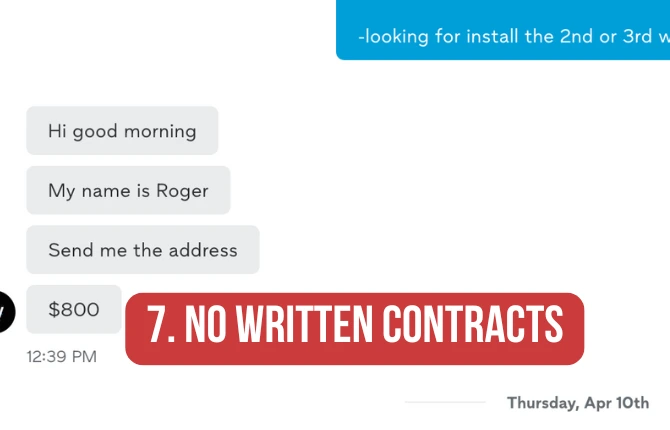
And don’t fall for the “We’ll write it up after you sign” trick. If they won’t give you a written quote before you commit, they’re either disorganized or don’t want to be held accountable.
Consequently, the Illinois Attorney General’s Office advises homeowners to scrutinize all contracts and to avoid any contractor who refuses to provide complete documentation.
Fly-By Night Roofer Red Flags
- Verbal pricing or loose “we’ll figure it out” agreements
- Missing material types, warranty info, or permit details
- No start or end dates
- Quotes scribbled on the back of a business card or texted to you
- Pushes you to sign before giving a full breakdown
Green Flags
- Detailed, written contract estimate with all labor, materials, and timelines spelled out
- Clear scope of work: what’s included, what’s not
- Itemized materials list (e.g., GAF Timberline HDZ shingles, synthetic underlayment, etc.)
- Copies of licenses, insurance, and warranty info attached
- Everything is provided before you’re asked to sign or commit
Pro Tip from Andre:
“No paperwork? No deal. A clean, detailed estimate is Roofing 101. It’s not just about trust—it’s about professionalism. If they can’t get that right, what makes you think they’ll install the roof right?”
At HomeHero Roofing, we provide every homeowner with a written quote that’s clear, complete, and easy to understand.
Notwithstanding, this applies to full roof replacement or simple repairs. To be sure, absolute transparency is not optional when dealing with a great roofer.
8. Delayed Responses and Poor Communication
If a roofer can’t return a phone call or show up on time for your estimate, what makes you think they’ll be reliable once they have your money?
One of the biggest red flags we see from homeowners calling us for second opinions is poor communication. It always starts the same way: “We hired someone last month, but now we can’t get a hold of them.”
Even worse, you might run into a roofing contractor that just shows up out of the blue and start working on your house.
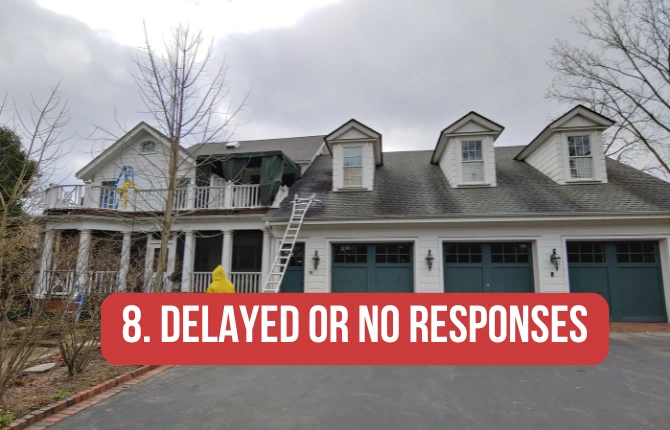
Whether it’s ghosting, missed appointments, or weeks of radio silence, these are warning signs of how the rest of the job will go. In the roofing industry, time matters. In the same way, delays mean leaks, roof damage, and stress.
Honestly, how will they manage an entire crew on your roof if they can’t handle a phone call?
By all means, this happens all over Chicagoland, especially when dealing with one-man show roofing services that overbook, underdeliver, and dodge accountability.
Unprofessional Roofer Red Flags
- Doesn’t show up for the scheduled estimate, or shows up late without notice
- Takes days (or weeks) to return calls or texts
- Dodges basic questions about scheduling, materials, or crew
- Sends unclear or conflicting info before or during the job
- Doesn’t confirm timelines in writing
Green Flags
- Reputable companies respond fast via phone, text, or email
- Clear, professional communication every step of the way
- Confirms appointment windows and shows up on time
- Provides a point of contact for the job—no guessing who’s in charge
- Proactively updates you if anything changes
Pro Tip from Andre:
“You shouldn’t have to chase your contractor down. Great communication is the first step to a smooth project—and if you’re getting crickets early on, it’s only downhill from there.”
Reputable roofing companies believe excellent communication is part of outstanding craftsmanship. As a result, they keep you in the loop from the first call to final cleanup.
With a top-notch roofer, you’ll always know who’s showing up, what’s happening, and when we’ll be done.
9. Fake Roofing Companies and Lead Resellers
Have you ever come across a roofing site with a name like “Downers Grove Roof Pros” or “Chicago Roofers Inc.”? Unsurprisingly, their websites don’t have faces, team photos, or an office address; all you see are stock images and a form asking for your info.
You probably weren’t on an honest roofing company’s website. You were on a lead reseller site. Indeed, these roofing company websites are built solely to collect your personal information and auction it off to the highest bidder.
These companies don’t do any roofing themselves. Instead, they resell your request to multiple contractors, often low-quality or out-of-town crews just trying to keep their schedules full.
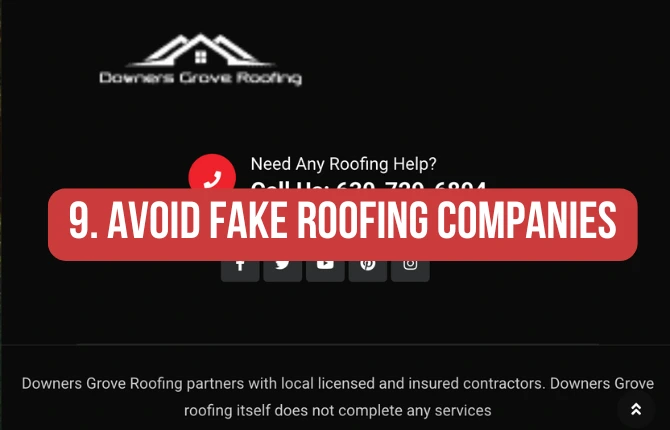
You often don’t even know who’s calling you until they arrive at your door.
Just check the fine print. For example, on DownersGroveRoofers (dot) com, the footer literally says:
“Downers Grove Roofing partners with local licensed and insured contractors. Downers Grove Roofing itself does not complete any services.”
Translation? You’re not hiring a roofer—you’re submitting your info to a call center.
Even worse, these sites often run fake Google listings, shady ads, and create the illusion of a local presence using mailbox services or virtual offices like Regus. Certainly, we’ve seen them pose as legitimate companies, using stock photos and AI-generated “team” headshots, hoping you don’t dig deeper.
Need more proof? NBC Chicago uncovered a nationwide ring of fake home repair sites scamming Illinois homeowners, including in the roofing space. As you can imagine, these sites made it nearly impossible for victims to track down who they actually hired.
Fake Roofing Service Red Flags
- Website has no names, team photos, or actual owner info
- Footer or disclaimers reveal “we partner with local contractors” or similar
- No physical address—or uses a Regus office or P.O. Box
- Generic stock photos with no real job site images
- Your quote request gets followed up by random companies you didn’t contact
Green Flags
- Real business address and owner information on the website
- Photos and videos of the actual crew, trucks, and jobs
- Transparent “About Us” page with company history and values
- Verified reviews on Google, Nextdoor, and BBB
- You’re dealing with one company from quote to completion—no outsourcing
Pro Tip from Andre:
“If you don’t know who you’re hiring, you’re not hiring anyone—you’re taking a gamble. Real roofers don’t hide behind vague websites and virtual offices.”
At HomeHero Roofing, you deal directly with our owners and in-house team. No lead resellers or call centers in India or the Philippines.
Make sure you talk to real people who live and work in your neighborhood when calling a roofer near you. Without hesitation, they understand local roofing needs and are accountable for the quality of work performed.
10. No Photos, References, or Project Examples
If a roofer can’t show you photos of their work, recent projects, or references from actual homeowners, you’re probably not dealing with a real pro.
Think about it—any reputable roofer in Downers Grove, Naperville, or Hinsdale has roofs going up every week. Have they only been in business for a few months and still can’t show you any job site photos or testimonials? That’s a major red flag.
The worst offenders rely on stock photography, AI-generated team headshots, or vague “before and after” shots with no context. Others might send you a couple of grainy cell phone pics or nothing at all.
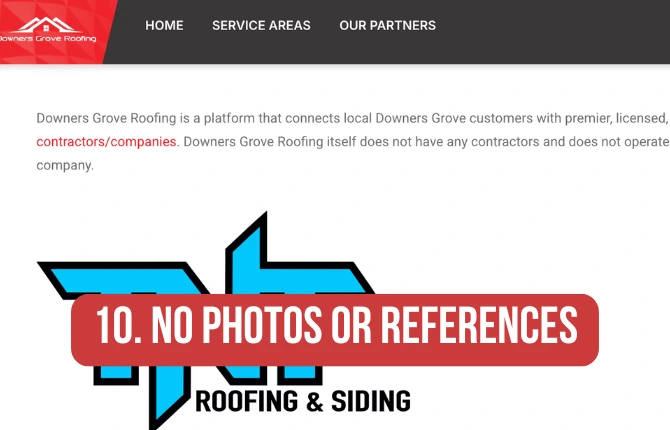
We’ve even encountered roofing companies that list fake reviews from accounts with no other activity or “testimonials” that read like generic filler copy.
In contrast, trustworthy roofers are proud of their work and have a library of photos, reviews, and references they’re happy to share.
Need proof that this matters? In a recent roofing scam out of Illinois, a homeowner paid over $25,000 without seeing a single reference. You already know how that ended.
Roofing Contractors Red Flags
- No job site photos or videos—only stock images
- Refuses to provide references or delays when asked
- Testimonials on website are vague, unverified, or fake
- Social media pages are inactive or full of generic content
- “Project gallery” has no locations, names, or context
Green Flags
- Dozens (or hundreds) of photo-documented jobs in nearby suburbs
- Willing to share 1–2 recent local homeowner references (with permission)
- Detailed Google and Nextdoor reviews that mention real homes, locations, or results
- Active Instagram or Facebook pages showing current projects and crews
- Transparent about who did the work—no hiding behind subcontractors
Pro Tip from Andre:
“Don’t just take their word for it—make sure they can show the receipts. At HomeHero, we document every step of our jobs and will gladly show you similar work in your neighborhood.”
From photo walkthroughs of roof installs in Naperville to client shout-outs in Willowbrook, we make our work visible, because we’re proud of it. No question, you deserve to know what you’re paying for as a homeowner replacing their roof.
2025 Update: Insurance Companies Are Cracking Down on Storm Chasers
In 2025, insurance companies are tightening their policies around roofing claims—especially those related to storm damage. Across the country, insurers are requiring more documentation, reducing claim windows, and shifting toward policies that only cover the depreciated value of older roofs. That means many homeowners are left footing a much larger portion of the bill than they expected.
Why the change? The rise in storm-chasing roofers submitting exaggerated or outright fraudulent claims has caught the attention of the industry. As a result, insurers are now flagging certain roofing claims for extra scrutiny, particularly in areas hit by frequent hail or wind storms.
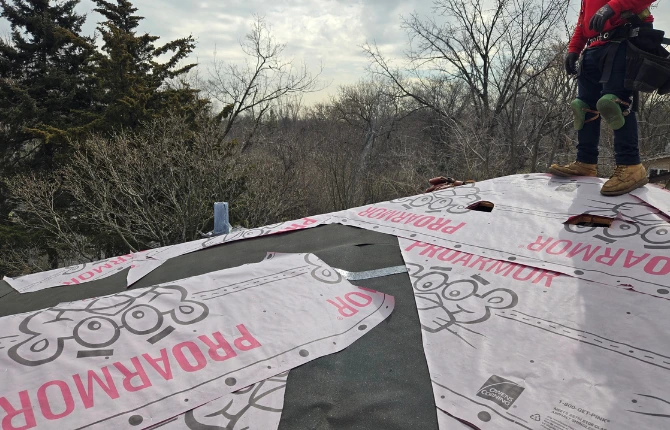
According to the National Insurance Crime Bureau, this kind of roofing fraud has become a widespread issue—one that puts both policyholders and insurance companies at risk.
So if someone shows up at your door after a storm offering a “free roof,” be skeptical. It could not only lead to a denied claim, but also increase your premiums or trigger an audit of your entire policy.
Final Thoughts: Don’t Get Burned by a Bad Roofer
Roofing scams are everywhere—from slick-talking storm chasers to shady lead resellers using fake local names. And the worst part? The damage they cause goes beyond your roof. These scammers cost homeowners their savings, time, and peace of mind.
Unfortunately, they take advantage of your neighbors, especially during tough times, like when your roof leaks after a significant windstorm.
The good news? Now you know what to look for to avoid these roofing con artists.
Whether in Downers Grove, Hinsdale, Westmont, or La Grange, the red flags are the same—and so are the green ones.
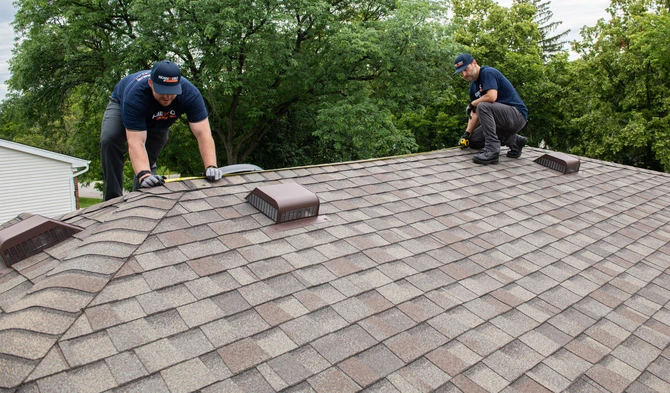
Luckily there are still plenty of great roofing services out there like HomeHero Roofing in Downers Grove, IL.
From upfront pricing and licensing to communication and transparency, spotting a good roofer takes the right questions (and a little gut instinct).
Don’t roll the dice if you’re reading this and feel unsure about a roofer you’re considering.
Call us at HomeHero Roofing. We’ll give you a free second opinion, walk you through the quote, and tell you what’s real and fake—zero pressure, no gotchas.
FAQs: How To Find a Trustworthy Roofer in Illinois
Finding a reputable roofer in Illinois or your state shouldn’t be difficult. As homeowners ourselves, we believe that knowledge is power. Using this guide, you’ll be well-equipped to avoid red flags and hire the right roofing contractor in Burr Ridge, IL, or any other suburb nationwide.
Likewise, here are a few additional questions homeowners ask when comparing roofing estimates from local roofers.
What’s a normal roofing deposit in Illinois?
Generally speaking, a reasonable deposit for roofing work in Illinois is around 10–20% of the total cost. Oftentimes, a red flag is anything above 50% upfront or full payment before work starts.
How do I spot a fake roofing company online?
Watch out for websites with no real team photos, vague “About Us” pages, or fine print that says they “partner with local contractors.” Google the business name + “scam” and check their reviews. If there’s nothing? That’s something.
Moreover, reputable roofers have honest reviews online and are often BBB-accredited with an A+ rating.
What’s the average number of reviews a trustworthy roofer should have?
Look for at least 40+ reviews on Google, Yelp, BBB, or Nextdoor. If they’ve been in business more than a year and can’t show that kind of track record, it’s worth digging deeper.

With two decades of experience launching and scaling successful companies in the home improvement industry, Andre brings unparalleled expertise and passion to HomeHero Roofing. Committed to delivering the highest-quality roofing services, Andre ensures every project meets the exceptional standards that HomeHero customers expect and deserve.

